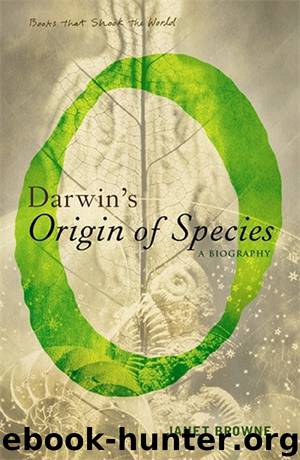Darwin's Origin of Species by Janet Browne

Author:Janet Browne
Language: eng
Format: mobi, epub
Publisher: Atlantic Books Ltd
Published: 2011-04-03T21:00:00+00:00
CHAPTER 5
Legacy
Twenty-three years after publishing the book that made him famous, Darwin died at home, aged seventy-three. He was buried in Westminster Abbey, in London, the more usual location for state funerals, royal marriages and national celebrations. Such a burial site for the author of On the Origin of Species was ironic in many ways, for the nation was well aware of Darwin’s reputation for having undermined church authority. By the time of his death, however, Darwin was fêted as a great scientific celebrity, a grand old man of science, someone who had looked further and seen more than others, of an intellectual rank as great as Newton, and certainly deserving to be honoured in the country’s primary commemorative setting. Professors, churchmen, politicians, medical luminaries, aristocrats and members of the public crowded the Abbey to see him to the grave. ‘Happy is the man that findeth wisdom’ sang the choir. It is hardly possible nowadays for us to guess whether Darwin died a happy man but he was certainly revered for his achievement and personal character, the very model of what a man of science ought to be.
However, despite this reverence, the cultural world was entering a different phase, recognizably more modern in tone. The fierce religious controversies of earlier days were subsiding. By regarding the Bible as an allegorical text filled with spiritual meaning, it became possible for Christian believers to retain their belief in the truth of God’s message while also appreciating scientific findings as a different kind of truth. Moreover, the power of the Church itself was on the wane. Many of these changes were retrospectively attributed to the Origin of Species. Honours paid to Darwin at his funeral liberally acknowledged his important role in constructing the modern frame of mind.
His scientific legacy, though, was not nearly as secure. As fresh areas of research opened up in the biological sciences, and new kinds of professionals took up a wider range of problems with more sophisticated techniques, the original thesis of natural selection was modified almost beyond recognition. There was dispute about the central concepts of competition, success and ‘fitness’, particularly in the way these interlaced with contemporary political ideologies. Alternative evolutionary systems based on direct responses to the environment came into play. Indeed, it is frequently said that Darwinism was eclipsed by other systems of evolutionary thought towards the end of the nineteenth century, not to be restored until a ‘new synthesis’ was put forward in the 1940s.
Much of this eclipse rested on fresh critiques of the main struts of Darwin’s original proposals. Social Darwinism was criticized as it climbed to pre-eminence in political thought around 1900. Wallace came to reject the competitive aspects of Darwinian biology as applied to human society and supported utopian socialist principles. Elsewhere J. Keir Hardy argued that progress took place via group selection in which individuals felt sympathy for one another. In Russia, the prevailing ideology was that the main struggle for existence was not species against species, but species against the environment.
Download
This site does not store any files on its server. We only index and link to content provided by other sites. Please contact the content providers to delete copyright contents if any and email us, we'll remove relevant links or contents immediately.
Sapiens: A Brief History of Humankind by Yuval Noah Harari(14390)
Sapiens by Yuval Noah Harari(5372)
Pale Blue Dot by Carl Sagan(5010)
Homo Deus: A Brief History of Tomorrow by Yuval Noah Harari(4919)
Livewired by David Eagleman(3775)
Origin Story: A Big History of Everything by David Christian(3692)
Brief Answers to the Big Questions by Stephen Hawking(3436)
Inferior by Angela Saini(3316)
Origin Story by David Christian(3202)
Signature in the Cell: DNA and the Evidence for Intelligent Design by Stephen C. Meyer(3139)
The Gene: An Intimate History by Siddhartha Mukherjee(3099)
The Evolution of Beauty by Richard O. Prum(3000)
Aliens by Jim Al-Khalili(2830)
How The Mind Works by Steven Pinker(2816)
A Short History of Nearly Everything by Bryson Bill(2699)
Sex at Dawn: The Prehistoric Origins of Modern Sexuality by Ryan Christopher(2530)
From Bacteria to Bach and Back by Daniel C. Dennett(2485)
Endless Forms Most Beautiful by Sean B. Carroll(2483)
Who We Are and How We Got Here by David Reich(2437)
